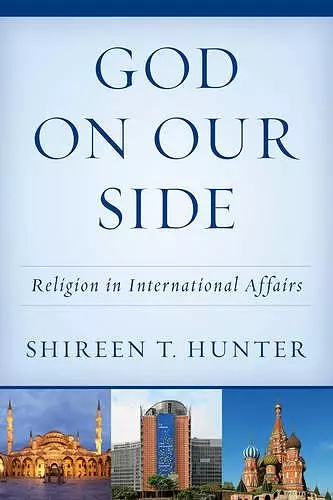God on Our Side
Religion in International Affairs
Format:Paperback
Publisher:Bloomsbury Publishing PLC
Published:4th Oct '16
Currently unavailable, and unfortunately no date known when it will be back
This paperback is available in another edition too:
- Hardback£99.00was £99.00(9781442272576)

This timely book offers an accessible introduction to religion in international affairs. Shireen T. Hunter highlights the growing importance of religion in politics and analyzes its nature, role, and significance. She places the question of religion’s impact on global affairs in the broader context of state and nonstate actors, weighing the factors that most affect their actions. Through the lens of three compelling and distinctive case studies—Russia’s response to the Yugoslav crisis, Turkey’s reaction to the Bosnian war, and Europe’s policy toward Turkish membership in the EU—Hunter demonstrates that religion increasingly shapes international affairs in significant and diverse ways. Her book is essential reading for anyone needing a better understanding of why and, more important, how, religion influences the behavior of international actors and thus the character of world politics.
Have students of international relations underplayed the role of religion? Hunter says no, but the resurgence of religion in domestic politics during the past 40 years requires a systematic framework to isolate this impact on foreign policy. The end of the Cold War, the breakup of the Soviet Union and Yugoslavia, and Western intervention in Afghanistan and Iraq have forced many states, old and new, to reshape their national identities—often by recalling a religiously infused past. Cosmopolitan/universalistic ideals retreated as religious conflict and ethnic sorting created new states and political movements. And the competition of non-state actors, ranging from the United Nations, NGOs, and terrorist entities, have especially pressured weak states to shape religiously inflected ideologies to enhance and consolidate their power. Three case studies—Russia’s policy toward the Yugoslav crisis, Turkey’s policy toward the Bosnian War, and European policy toward Turkish membership in the EU—constitute the core of the book. Both Russian and Turkish foreign policy demonstrate the continued centrality of security and national interest in their responses to the Yugoslav breakup. Europe’s resistance to Turkish membership, ironically, is suffused with secularized forms of Christianity.
Summing Up:Recommended. Upper-division undergraduates through faculty.
Both used and abused, religion is becoming a key paradigm in international relations. Through meticulous research and great clarity, Shireen Hunter dissects the role of religion in global affairs. This book is essential reading for all those wishing to dig into the complex nexus between religion and international politics, which for good and ill has become a defining phenomenon of our age. -- Nathalie Tocci, Istituto Affari Internazionali, Rome
Shireen Hunter problematizes some of the conventional assertions in the literature, providing a challenging framework that incorporates state interests, domestic factors, and national identity to address the role of religion in world politics. The three diverse case studies provide an interesting platform to critically reflect on domestic and international factors that affect and shape the scope and limitation of the role of religion. This is a highly instructive and useful book for both students and informed publics. -- Mohiaddin Mesbahi, Florida International University
This book is a welcome contribution to the debate about the new visibility of religion in the shaping of international affairs. It offers pragmatic guidelines, relevant definitions, and case studies to take religion fully into account. -- François Foret, Université Libre de Bruxe
ISBN: 9781442272583
Dimensions: 227mm x 153mm x 17mm
Weight: 390g
274 pages